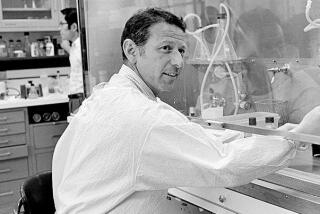Fred Burg; Inventor, Tool Manufacturer
- Share via
Fred G. Burg, inventor and founder of Burgmaster Corp. machine tool manufacturer who personally held more than 50 patents, including the first for automatic transmissions for automobiles, has died. He was 99.
Burg, whose Gardena plant faded from existence in 1986, died Wednesday in Los Angeles, his grandson, Randall Burg, said Thursday.
The rise and demise of Burgmaster was chronicled in a critically acclaimed 1989 book, “When the Machine Stopped” by Max Holland, whose father worked 29 years for Burg.
Burg’s various inventions have been exhibited at the Smithsonian Institution in Washington.
His automatic transmission design was marketed by Dodge in the mid-1950s as the push-button “Electroglide.”
But Burg’s company flourished on another of his inventions, dubbed the Burgmaster, which consisted of a drill press with a rotating turret that enabled an operator to change drill bit sizes rapidly. The gadget streamlined a cumbersome process that had required five machines to drill five different-size holes in metal.
By 1957, computer-driven Burgmasters were being demonstrated at national trade shows. The device was used to automate production of metal parts--the beginning of factory automation and what became known as numerically controlled machine tools.
A native of Czechoslovakia, Burg started working as a locksmith at age 10. At 13, he emigrated with his family to Chicago, where he became a lathe operator at International Harvester, supporting his 11 brothers and sisters.
Attending night school whenever possible, Burg worked in his in-laws’ dry goods business after his marriage in 1920. He rose to the position of manager of a department store but never gave up his love of tools or his inventions.
In 1943, he uprooted his family and moved to Los Angeles to establish the Burg Tool Manufacturing Co. Operating out of his garage, he designed and built what he called the Tool-flex floating tool holder. The device prevented drills and taps from snapping off in a shop production line.
He included his son, Joe, and son-in-law, Norman Ginsburg, in the operation when they got out of the Army after World War II. All three families lived in a single house in Hollywood, with the two young men building the device and Burg, affectionately called “the old man” by his employees for decades, traveling to sell it.
The company was taken over by Houdaille Industries in 1965 and went out of business two decades later.
The young Burg said his grandfather, although crippled from childhood polio and blind from diabetes, continued inventing until his death.
More to Read
Inside the business of entertainment
The Wide Shot brings you news, analysis and insights on everything from streaming wars to production — and what it all means for the future.
You may occasionally receive promotional content from the Los Angeles Times.








